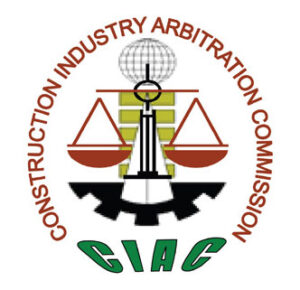
left), Atty. Luis de la Paz, Cebu road show champion (third from right), and Asst. Sec. Gen. Francisco Pabilla, Jr.,
(rightmost), together with the participants of the Cebu ADR forum.
PDRCI launched its road show to promote alternative dispute resolution (ADR) in the Philippines on November 25, 2016 at the Casino Español in Cebu City.
The forum, with the theme “How to Avoid Costly Litigation: Resolving Disputes through Effective ADR,” featured several speakers from PDRCI. Secretary General Roberto Dio introduced ADR and
PDRCI to the participants, composed mostly of engineers and lawyers from consulting firms in Cebu City. PDRCI Trustee Mario Valderrama spoke on formulating the ADR clause and the use of ADR in commercial contracts. Atty. Luis de la Paz, who was as event champion, talked on negotiation, followed by Asst. Sec. Gen. Francisco Pabilla, Jr. who discussed how mediation works. Atty. Dio wrapped up the event with a talk on careers in ADR.
The forum was sponsored by de la Paz Paulino & Associates, Gonzales Batiller Leabres & Reyes, Marcbilt Construction, Inc., and Flour Daniel, Inc. PDRCI will hold the second leg of its road show on February 24, 2017 at the San Agustin University in Iloilo City.
Waiver of Appeal: Testing the limits of party autonomy under Philippine law
PART TWO
Last issue, the authors discussed the right to appeal an arbitral award in other jurisdictions. This part examines the question if the parties to an arbitration may waive their statutory right to appeal on the merits.
Under Philippine jurisprudence, the right of appeal is merely a statutory privilege that may be waived. The right to appeal is “neither a natural right nor a part of due process, but merely a statutory privilege which may be exercised only in the manner and in accordance with the provisions of law, failing which, the right to appeal [may] be lost.” (Lantion v. One Realty, G.R. No. 194788, Jan. 21, 2015) Article 1878 of the Philippine Civil Code allows parties to “renounce the right to appeal from a judgment” through a special power of attorney.
 The Supreme Court has likewise upheld provisions in compromise agreements waiving the parties’ right to appeal. In Laguna College v. Court of Industrial Relations, an appeal from a compromise judgment was dismissed pursuant to the parties’ agreement “[t]hat, except on questions of law, both parties hereby waive the right to appeal any decision or order that may be rendered by the Trial Court…” (G.R. No. L-28927, Sept. 25, 1968). In Enriquez v. Padilla, the provision in a compromise agreement waiving the right to appeal was also upheld (G.R. No. L-782, Sept. 17, 1946).
The Supreme Court has likewise upheld provisions in compromise agreements waiving the parties’ right to appeal. In Laguna College v. Court of Industrial Relations, an appeal from a compromise judgment was dismissed pursuant to the parties’ agreement “[t]hat, except on questions of law, both parties hereby waive the right to appeal any decision or order that may be rendered by the Trial Court…” (G.R. No. L-28927, Sept. 25, 1968). In Enriquez v. Padilla, the provision in a compromise agreement waiving the right to appeal was also upheld (G.R. No. L-782, Sept. 17, 1946).
While arbitration agreements are not compromise agreements, there is no reason why a provision waiving the remedy of appeal would be valid in one but not in the other. Compromise agreements are contracts that aim to put an end to pending litigation or to avoid one from ever arising (Spouses Abinujar v. Court of Appeals, G.R. No. 104133 Apr. 18, 1995). Arbitration agreements are contracts that allow parties to avoid court litigation (Cargill Philippines v. San Fernando Regala, G.R. No. 175404, Jan. 31, 2011; Lanuza v. BF Corporation, G.R. No. 174938, Oct. 1, 2014). The Laguna and Enriquez rulings should equally apply to arbitration agreements.
Other jurisdictions have taken a similar approach. In the United States, for example, Courts of Appeals and district courts have expressed the view that appeal from arbitral awards on the merits may be renounced by contracting parties.
In Tabas v. Tabas, the United States Third Circuit Court of Appeals held that the award may not be reviewed on the merits because the parties provided for a “final, binding, and non-appealable” arbitration (3d Cir. 1995). This was reiterated in Rollings, Inc. v. Black where the Eleventh Circuit Court of Appeals stated that an agreement that the award would be “binding, final, and non-appealable” means that the parties relinquish their right to appeal the merits of their dispute except on limited statutory grounds, namely, abuse of authority, partiality, or manifest disregard of the law (11th Cir. 2006; see footnote 1). In Aerojet v. American Arbitration Association, the Ninth Circuit Court of Appeals noted that the parties to an arbitration can agree to eliminate all court review, but “the intention to do so must clearly appear” (9th Cir. 1973).
In re Wal-Mart Wage and Hour Employment Practices Litigation subsequently clarified that the Aerojet ruling is not controlling. The Ninth Circuit Court of Appeals of the United States distinguished appeals on the merits from the challenge procedure under the Federal Arbitration Act. The court ruled that while appeals on the merits might be waived, the grounds for challenge under the Act may not be so waived (9th Cir. 2013). The Wal-Mart ruling may be made applicable to arbitral awards in the Philippines, particularly with respect to domestic arbitrations that are governed by Republic Act No. 876 (1953), which was patterned after the U.S, Federal Arbitration Act.
 The Ontario Supreme Court went a step further, holding that parties might in fact waive the right to appeal even under Article 34 of the Model Law. In the Canadian case of Noble China Inc v Lei, the parties tried to settle a dispute through a settlement agreement where the parties included the following arbitration clause: “No matter which is to be arbitrated is to be the subject matter of any court proceeding other than a proceeding to enforce the arbitration award”. The Ontario Court (General Division) ruled that parties may exclude the grounds for setting aside an award, provided that their agreement does not conflict with a mandator y provision of the Model Law or principles of public policy. Here, the Ontario Court took the view that Article 34 of the Model Law was not a mandatory provision and thus could be contracted out by the parties [42 O.R. (3d) 69, 1998].
The Ontario Supreme Court went a step further, holding that parties might in fact waive the right to appeal even under Article 34 of the Model Law. In the Canadian case of Noble China Inc v Lei, the parties tried to settle a dispute through a settlement agreement where the parties included the following arbitration clause: “No matter which is to be arbitrated is to be the subject matter of any court proceeding other than a proceeding to enforce the arbitration award”. The Ontario Court (General Division) ruled that parties may exclude the grounds for setting aside an award, provided that their agreement does not conflict with a mandator y provision of the Model Law or principles of public policy. Here, the Ontario Court took the view that Article 34 of the Model Law was not a mandatory provision and thus could be contracted out by the parties [42 O.R. (3d) 69, 1998].
In other jurisdictions, domestic laws even contain express provisions allowing parties to waive the right to appeal on the merits. For example, under the Singapore Arbitration Act, parties to an arbitration may generally appeal to the regular courts on questions of law. This notwithstanding, parties may nonetheless “agree to exclude the jurisdiction of the Court.” [Singapore Arbitration Act of 2001, § 49 (2)] In fact, in the Singapore High Court case of Daimler South East Asia Pte Ltd v. Front Row Investment Holdings, an arbitration under the Singapore Arbitration Act, the Singapore High Court held that reference to the ICC Arbitration Rules in an arbitration clause is sufficient to exclude the right of the parties to appeal a question of law (in a domestic arbitration) to the Singapore courts (SGHC 157, 2012).
Quite similar to the Singapore Arbitration Act is the English Arbitration Act 1996, which gives parties to the arbitration the right to appeal to the regular courts on question of law, “unless otherwise agreed by the parties.” [English Arbitration Act 1996, § 69 (1)] Applying this rule, in the House of Lords case of Lesotho Highlands Development Authority v Impregilo SpA and others, Lord Steyn similarly held that “the parties are free to exclude this right of appeal by agreement. They did so by ICC Rules, article 28.6 in the case before the House.” [1 AC 221 at 3 (2006)].
In conclusion, under Philippine law the parties may waive the remedy of appeal on the merits in their arbitration agreements. To borrow the words of the United States Seventh Circuit Court of Appeals, “A loser at a commercial arbitration might very well wish to circumvent the arbiter’s decision and head unencumbered for the courts. But if final and binding arbitration is to ser ve its purpose, it must be just that—final and binding. Arbitration would otherwise become little more than a procedural detour, without ultimate significance (Dean v. Sullivan, 7th Cir. 1997).
